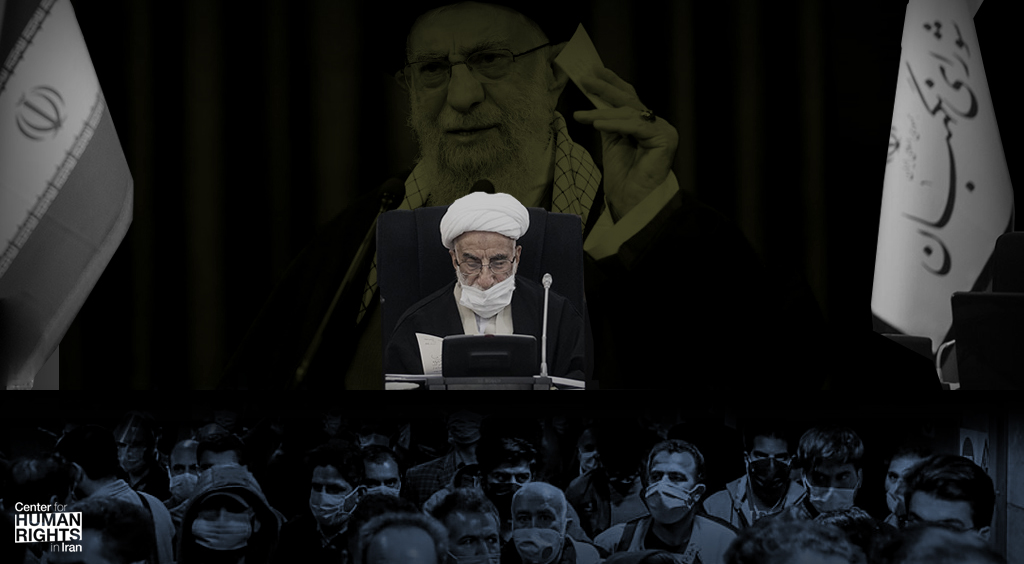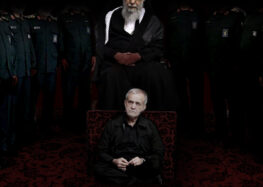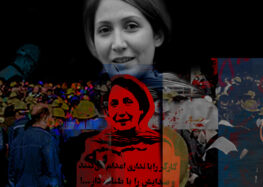Iran Election: Guardian Council Flexes Muscle, Unlawfully Imposes More Qualification Requirements
 A directive “ratified” by Iran’s Guardian Council, imposing new requirements for candidates to qualify to run in Iran’s June 2021 presidential election, has once again revealed the unconstitutional practices of the powerful unelected body.
A directive “ratified” by Iran’s Guardian Council, imposing new requirements for candidates to qualify to run in Iran’s June 2021 presidential election, has once again revealed the unconstitutional practices of the powerful unelected body.
Accountable only to the supreme leader, the council of six clerics and six jurists is constitutionally mandated to vet laws and elections for conformity with the state’s interpretation of Islamic principles and its interpretation of the Constitution.
The Guardian Council has a documented history of interfering in parliamentary and city council elections.
In 2017, it disqualified Minoo Khaleghi, a female reformist candidate elected in Isfahan, after photos were shared on social media networks showing her shaking the hand of a man during a trip abroad. (Shaking the hand of an unrelated person of the opposite sex is illegal in Iran).
The council has also disqualified non-Muslims from running for office in city council elections.
The majority of the council’s conservative clerics have consistently shown less interest in upholding the Constitution than protecting the unaccountable supremacy of the Islamic Republic against anyone that challenges its actions and policies.
A month before Iran’s June 18 presidential election, the Council rejected the notion that its directive sent to the Interior Ministry on May 5, 2021, was an arbitrary act of legislation—while insisting that its enforcement is “mandatory.”
Article 115 of Iran’s Constitution does not describe any requirement for the Guardian Council to set qualification requirements for presidential candidates.
It states, “The President must be elected from among religious and political personalities possessing the following qualifications: Iranian origin; Iranian nationality; administrative capacity and resourcefulness; a good past-record; trustworthiness and piety; convinced belief in the fundamental principles of the Islamic Republic of Iran and the official religion of the country.”
For decades, elections in the Islamic Republic of Iran have been fraught with undemocratic restrictions that eroded constitutional freedoms under an increasingly repressive and authoritarian climate.
The Guardian Council’s directive is the body’s latest action revealing its aim to unlawfully engineer elections in favor of the ruling political elite.
Legislator or Interpreter of the Constitution?
Critics of the directive, including reformist politicians and civil rights activists, have pointed out the council’s lack of legislative powers.
The nine articles in Iran’s Constitution that mention the body only state that it should review legislation for compatibility with the Constitution and Islam, and that it can interpret constitutional questions.
Critics say the directive is a blatant violation of Article 73 of the Constitution, which gives Parliament, not the Guardian Council, the authority to interpret “ordinary” or non-Islamic laws.
“Based on Article 71 of the Constitution, Parliament is the sole authority for setting standards and legislating qualifications (for candidates) and after becoming law, it is the President who submits them for enforcement,” said a rebuttal from President Hassan Rouhani’s Office for Legal Affairs on May 10.
His office also ordered the Interior Ministry to continue following existing laws and regulations—essentially to ignore the Guardian Council’s directive.
Indeed, enforcing the Guardian Council’s directive could be punishable under Article 570 of the Islamic Penal Code: “Any official and agent associated with State agencies and institutions, who unlawfully strips members of the public of their personal freedom or deprives them of their rights provided in the IRI Constitution, shall be sentenced to two months to three years’ imprisonment, in addition to dismissal from the service and prohibition of employment in state offices for one to five years.”
It is extremely difficult to qualify to run in Iran’s presidential election due to restrictive requirements such as religion and gender; only Shia Muslim males can qualify.
The additional 12 requirements in the Guardian Council’s directive include an age requirement (40-75), holding a higher education degree (masters), state and military experience, and no convictions especially in connection with the “2009 Insurrection,” a derogatory reference used by officials to describe Iran’s 2009 mass street protests known as the Green Movement.
The council’s own explanation for the directive refers to its powers granted by the supreme leader and to articles in the Constitution. The council communicated its reasoning in the following (excerpted) text:
“In accordance with Clause 5 of Article 10 of the ‘General Policies on Elections’ laid out by Leader of the Islamic Revolution Ayatollah Seyed Ali Khamenei, which have assigned the Guardian Council to ‘define and declare the necessary criteria and conditions for the identification of the political and religious personalities and the qualities that determine the managerial characteristics and skillfulness of the presidential candidates,’ and considering the Clause 9 of Article 110 and Article 115 of the Constitution of the Islamic Republic of Iran, the Guardian Council ratified those definitions, criteria, and conditions at a meeting on January 10, 2018, and amended those standards at a meeting on April 28, 2021.”
Guardian of the Constitution or the Sharia State?
According to Chapter 10 of Iran’s 1979 draft constitution, titled the “Guardians of the Constitution Council,” Article 142 stated that the council’s only duty was to “protect the Constitution by ensuring common laws are compatible with it.”
However, in the current Constitution, which was amended in 1989, the reference to the Constitution was dropped from the Council’s title to emphasize its role as the protector of not only the Constitution but Sharia (Islamic law)—and the country’s ruling Islamic theocracy
The Guardian Council consists of six Shia Muslim theologians appointed by the supreme leader and six lawyers nominated by the judiciary chief, who is also a supreme leader appointee.
The council’s chairman, who has defended the age limit on presidential candidates, is 95-year-old Ayatollah Ahmad Jannati.
Read this article in Persian






